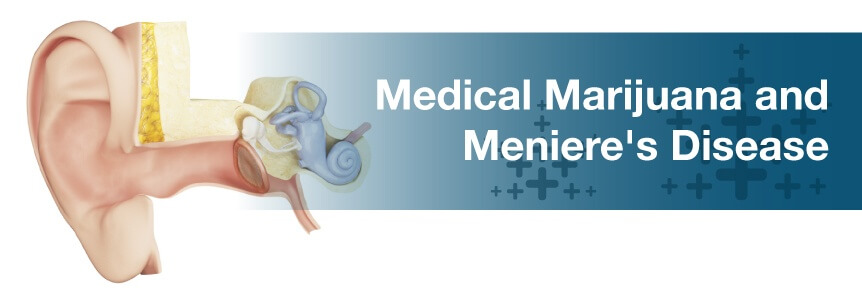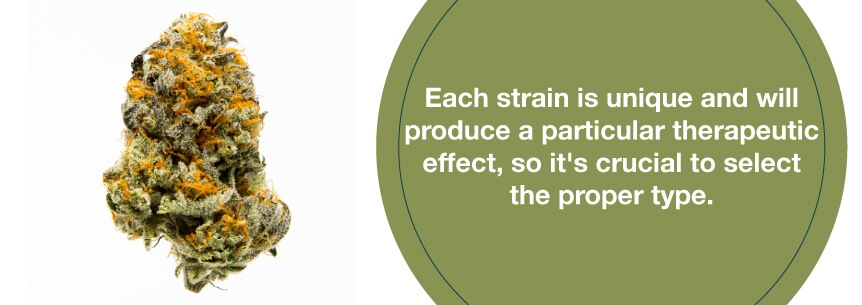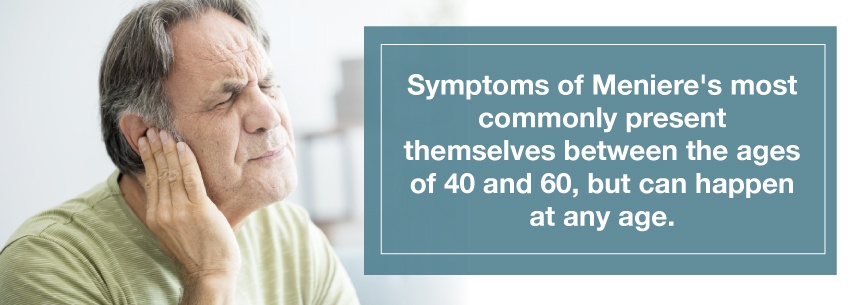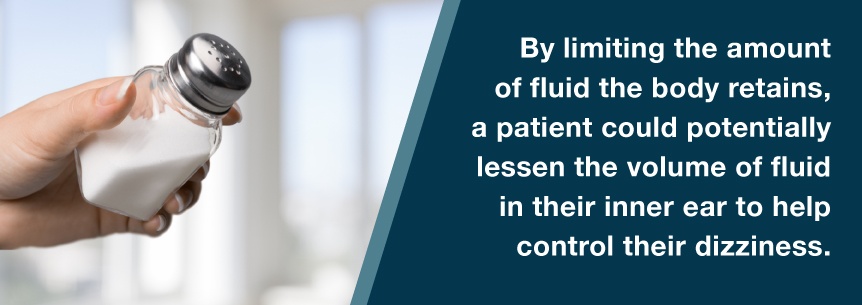
Meniere’s disease can significantly impact an individual’s quality of life. The symptoms of this disorder can be mild and frustrating, or severe and debilitating, depending on the individual. Thankfully, medical marijuana can be an effective treatment option that helps alleviate the symptoms this condition brings on and help patients regain normalcy in their lives. If you are suffering from the symptoms of Meniere’s disease, you may consider using specific strains of medicinal cannabis to lessen the severity of your disorder.
Medical marijuana has potential application throughout the spectrum of human health conditions. Research has already shown that cannabis can help patients suffering from a variety of illnesses, diseases and disorders manage, cope with and lessen their painful or uncomfortable symptoms. Medical cannabis can even help improve the quality of life for adults of many ages, genders and medical histories. With so much research already complete, and yet so much more to conduct, there is a possibility medical marijuana for Meniere’s disease can be an effective treatment option.
Find A Doctor Find A Dispensary

The causes of Meniere’s disease are still largely unknown to the medical community. Without an understanding of what factors directly cause this disorder, it’s difficult for physicians and researchers to identify a treatment option that will target and treat the disorder itself. However, doctors have identified the symptoms of Meniere’s disease, and medical marijuana may be an effective treatment option for some patients. Common symptoms of Meniere’s disease that patients could treat with medical cannabis include:
If you and your physician agree medical marijuana is a treatment option that will help alleviate your symptoms and improve your quality of life, the next step is to choose the appropriate strain. Pot dispensaries sell many strains of cannabis that have the potential to treat specific symptoms. Each strain is unique and will produce a particular therapeutic effect, so it’s crucial to select the proper type.

Let Marijuana Doctors connect you with a dispensary budtender in your area who can give you more information on the following strains that may benefit those suffering from Meniere’s disease.
For those suffering from severe nausea, we suggest trying:
For those suffering from nausea and vomiting, we suggest trying:
For those suffering from anxiety or stress, we suggest trying:
For those suffering from depression, we suggest trying:
For those suffering from insomnia, we suggest trying:
For those suffering from fatigue, we suggest trying:
Though marijuana has developed a reputation in many contexts as a recreational substance, every individual suffering from a health condition should approach all medications responsibly. Medical cannabis has the potential to cause an individual to experience negative side effects like dry eyes, dry mouth, headaches, and dizziness. Those who have Meniere’s disease should be especially aware of the limited, but possibly adverse, effects of marijuana. You should speak with your doctor to determine which strain of medical herb may alleviate your symptoms without causing a negative reaction.
Unlike some other treatment options, medical cannabis can be advantageous for patients because there are multiple methods of delivery into the body. Not only does this allow patients to choose to ingest their medicinal pot in a method they are personally comfortable with, it enables patients who are experiencing severe symptoms to receive their medicine in a way which may be easier and less painful than other alternatives.
There are many ways a patient suffering from Meniere’s disease can consume medical cannabis:
Depending on which method you use to bring cannabis into your body, you may feel the marijuana’s therapeutic effects at different rates and intensities. It’s essential for those with Meniere’s disease to understand how their chosen strain of cannabis will impact their bodies when they ingest, inhale or apply it topically. If possible, administer your initial doses of marijuana under the supervision of an adult who can assist you if necessary.
Many states have legalized the use of marijuana for medicinal and recreational use. However, there are still areas of our country that prohibit the use of all forms of cannabis for any reason. The legalities surrounding marijuana use will vary from state to state — even states that have legalized the drug may have differing interpretations of the law. Before you decide to try medical marijuana for Meniere’s disease, we recommend you familiarize yourself with your local marijuana laws.
There is currently no cure for Meniere’s disease. However, medical cannabis may be an effective treatment option that can successfully manage the severity and frequency of Meniere’s disease symptoms. To discover which strains of cannabis could be appropriate for your unique symptoms, let Marijuana Doctors direct you to a cannabis doctor conveniently located in your area. We can also help you find local cannabis dispensaries where you can learn more about each strain.
Find A Doctor Find A Dispensary
Meniere’s disease is a disorder of the inner ear, also known as idiopathic endolymphatic hydrops. This chronic disorder is not contagious or fatal. However, there is currently no cure available. Those with Meniere’s disease often seek help after suffering from symptoms which range from vertigo and hearing loss to nausea and inner ear pressure. A physician will usually arrive at a diagnosis after administering tests such as MRI or CT scans, balance tests or blood and hearing tests.
Because this disorder exhibits different symptoms and signs for each patient, experts classify Meniere’s disease into three categories.
Before the 19th century, physicians thought overfilled blood vessels in the head were the cause of neurological symptoms like seizures, headaches, and vertigo. To treat these issues, doctors used leeches and bloodletting. Physician Prosper Meniere noticed a group of patients faced symptoms of vertigo and hearing loss, leading him to theorize these ailments resulted from a hemorrhage in the inner ear. Today, medical professionals consider Meniere’s to be a relatively rare disorder in the United States.
Current data on Meniere’s disease reports the following statistics:

Unfortunately, Meniere’s disease in all its forms still remains a mystery in many ways. Though these statistics shed light on the current understandings and patient trends, the unknown cause and cure of this disorder may impact the accuracy of these findings.
Current medical research has not yet found a definite cause of Meniere’s disease. However, the causes of the symptoms appear to be from an increased volume of fluid in the inner ear. That has led some medical professionals to speculate that this excess of endolymph fluid in the inner ear directly causes Meniere’s disease. Other researchers suggest the causes of the disorder include constricted blood vessels, genetics, autoimmune reactions, viral infections or allergies. Factors that may be causing the presence of the fluid itself include:
Most medical professionals agree this disease is likely the result of several biological and environmental factors. They can, however, accurately rule out other inner ear conditions and successfully diagnose Meniere’s disease based on the prevalence and behavior of certain symptoms.
Meniere’s disease can cause you to experience various side effects relating to your hearing and balance. Many signs and symptoms of Meniere’s disease include the following:
Endolymph fluid builds up in the inner ear compartment called the labyrinth, which contains the organs we use for balance and hearing. These organs send signals to the brain regarding sound vibrations and the body’s movement and positioning. When too much of the endolymph fluid builds up and interferes with the signals these organs send, it causes the symptoms of Meniere’s disease.
Because these symptoms are similar to other disorders and health conditions, Meniere’s disease can be hard to diagnose. Often, physicians will attempt to rule out these other conditions first before assessing the possibility of Meniere’s disease. To receive a diagnosis of Meniere’s disease, an otolaryngologist — also known as an ear, nose and throat doctor — or another physician will review your medical history and look for the presence of four specific symptoms:
Researchers have yet to discover a cure for Meniere’s disease. However, this disorder is not fatal and can be managed. If you’re suffering from the symptoms of Meniere’s disease, your doctor may have you consider these treatment options to help cope with or alleviate your symptoms.

Most research seems to suggest that these symptoms can successfully mitigate or control their symptoms on their own or through the use of medications, dietary adjustments or other devices. Unfortunately, few cases may require a surgical alternative, and others still may not find the adequate relief they’re seeking from these treatments. Again, there is no cure for Meniere’s disease, so the success of any treatment option will depend on factors within each individual case.
Like many treatment options for other health conditions, the treatments your physician may recommend to you may include the risk of negative side effects. Many medications have the potential to display side effects in some patients. Drastic changes in diet may lead to other health issues, and not all cognitive therapy approaches are effective for every patient. Of course, there is always a risk involved with invasive treatment options like injections or surgeries. Consult with your physician for more information regarding treatment option risks.
Not only are researchers still trying to identify the cause and cure for Meniere’s disease, but they are also trying to find the most effective method for diagnosing the disorder. The electrocochleogram, or ECOG, is a reliable device in assessing Meniere’s disease. One study found that while ECOG test results do correlate with the criteria used to diagnose the disorder, it does not correlate with the symptoms patients were experiencing during the study. There is a possibility other methods may increase diagnostic accuracy.
Though many physicians may prescribe steroid injections for patients suffering from Meniere’s disease, one study reports the successful application of a topical steroid in treatment studies. Patients with intractable vertigo received topical dexamethasone via a ventilation tube for 90 days. The results of the study showed it controlled vertigo symptoms in nearly three-fourths of the patients, and that more than 15 percent of patients experienced an increase in hearing. This researcher believes topical treatments may be applicable to most patients with Meniere’s disease.